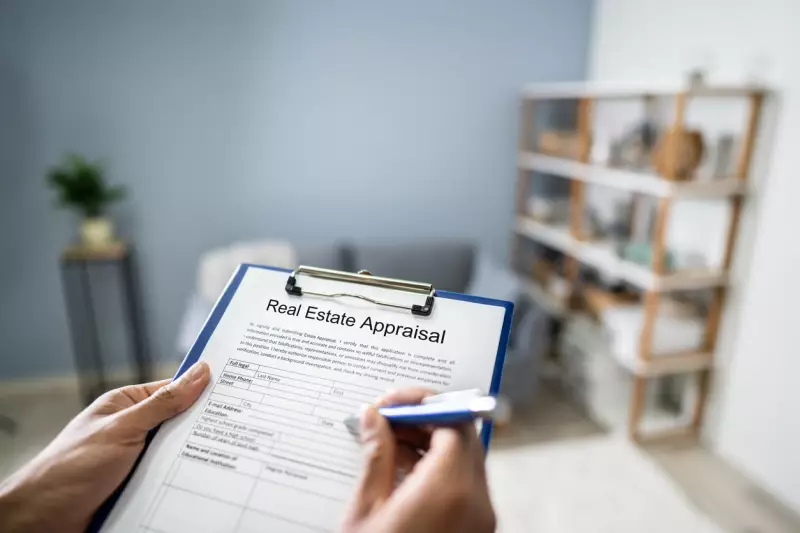What Is Appraised Value and What Does a Property Appraiser Do?

Table of Contents
- What Is Appraised Value and What Does a Property Appraiser Do?
- What Is Appraised Value?
- What Is a Property Appraiser?
- What Does a Property Appraiser Do?
- What Is a Personal Property Appraiser?
- When and Why You Might Need a Property Appraisal
- How To Find a Qualified Appraiser
- Common Myths About Appraisals
A property appraisal is an important part of many real estate and financial decisions. Whether you are selling a home, refinancing a mortgage, appealing a tax assessment, or setting the right insurance coverage, a reliable appraisal supports informed choices and protects your financial interests.
What Is Appraised Value?
Many homeowners often ask the question: what is the appraised value of my home? Appraised value, in real estate terms, refers to an impartial estimate of a property's fair market value, usually determined by a licensed appraiser. This value, as estimated by the professional assessor, is often used by lenders during the mortgage process to ensure the home's value aligns with the loan amount.
Note that the appraised value is different from other related real estate figures. Unlike market value, which reflects what buyers are willing to pay in a competitive marketplace, the appraised value is more objective and standardized. The appraised value is also not the same as the assessed value. The assessed value is the estimate of the worth of a property as determined by local tax authorities to calculate property taxes. The listing price, which is also not the same as the appraised value, is the price set by the property seller and their agent and may or may not reflect the property's actual value.
Several factors influence a home's appraised value, such as its location, square footage, overall condition, and recent sales of comparable properties. These factors help the appraiser determine a value that fairly represents what the home is worth in the current market, based on professional standards, rather than personal opinions or selling strategies.
What Is a Property Appraiser?
A property appraiser is a licensed professional who evaluates real estate in order to determine its appraised value. The services of property appraisers are required in certain scenarios such as during mortgage lending (where lenders rely on appraisals to ensure the property's value supports the loan amount) and in estate planning. In estate planning, a property appraiser helps determine the value of real estate assets for inheritance or tax purposes. Property appraisers are also used in divorce settlements cases as they help provide valuations required to divide property fairly between parties.
What Does a Property Appraiser Do?

A property appraiser typically follows a structured process to determine the appraised value of a real estate property. Usually, the process of determining the appraised value follows these steps:
- Property Inspection (Interior and Exterior): The appraiser begins by inspecting the property, including the interior and exterior parts of the property. These parts include the home’s structure, layout, square footage, number of rooms, condition, upgrades, interior design, any visible issues, lot size, curb appeal, and neighborhood features.
- Comparable Sales (Comps) Analysis: After the inspection, the appraiser researches recent sales of similar properties in the area, often referred to as “comps.” These comparable sales help provide a market-based context for the property's value, taking into account location, size, age, and features.
- Valuation Methods Used: Depending on the type of property and purpose of the appraisal, the appraiser may apply one or more of the following valuation methods:
- Cost Approach: The cost approach estimates how much it would cost to rebuild the property from scratch, minus depreciation.
- Sales Comparison Approach: The sales comparison approach evaluates the property against recent comparable sales, which is most common for residential properties.
- Income Method: The income method is used mainly for rental or investment properties and calculates value based on the income the property is expected to generate.
- Final Appraisal Report Delivered to the Lender or Client: Once the analysis is complete, the appraiser prepares a detailed report that includes the property description, the data gathered, the methods used, and the final appraised value. This report is then submitted to the lender, buyer, or other client involved in the transaction.
What Is a Personal Property Appraiser?
A personal property appraiser is a trained professional who evaluates and assigns value to items that are not real estate. Items that a personal property appraiser may evaluate include artwork, jewelry, antiques, vehicles, collectibles, machinery, and other valuable personal belongings. Personal property appraisers provide an unbiased estimate of an item's fair market value, replacement costs, or liquidation value, depending on the purpose of the appraisal.
Personal property appraisers differ from real estate appraisers, who focus solely on valuing land and buildings. While both professions involve formal training and certifications, personal property appraisers specialize in movable assets and usually have a deep knowledge in specific categories.
A personal property appraisal may be required in several situations such as when insurance companies require an appraisal to determine the coverage amount for valuable items. During a divorce or estate division, an appraisal conducted by a personal property developer helps ensure a fair distribution of assets. Personal property appraisers are also important when donating valuable items to a charitable organization, as the IRS may require a qualified appraisal for tax purposes.
When and Why You Might Need a Property Appraisal
You may need a property appraisal in the following situations:
- Buying or Selling a Home: When purchasing or selling real estate, an appraisal will help you to verify that the agreed-upon price aligns with the property's true market value. For buyers and their lenders, it confirms that the home is worth the loan amount. For sellers, it helps set a fair and competitive price.
- Refinancing a Mortgage: If you are refinancing your home loan, the lender will likely require a new appraisal to determine the current value of the property. This helps the lender assess the amount of equity you have and whether you qualify for better loan terms or interest rates.
- Appealing Property Taxes: Sometimes, local tax authorities may assign a higher assessed value to your property than what it is truly worth. In such cases, a professional appraisal may provide evidence to support a formal appeal and potentially reduce your property tax burden.
- Inheritance or Divorce Settlements: In inheritance or divorce cases where property division is required, a fair and accurate valuation becomes critical. An appraisal in such instances helps ensure that all parties receive an equitable share, preventing future disputes and aiding in legal resolution.
- Insurance Purposes: Homeowners insurance policies often require a clear estimate of the property's replacement cost. An appraisal may help determine how much coverage you need to fully protect your home in case of damage, loss, or disaster.
How To Find a Qualified Appraiser
Regardless of the reason why you need a property appraiser, it is important that you find a qualified one in order to ensure that you obtain a proper value for your property.
When searching for an appraiser, it is important that you look for one that holds the proper state license or certification. Note that each state regulates appraisers, and licensing ensures the individual has met education, training, and ethical standards. You may check with your state’s appraiser licensing board to verify credentials and find approved professionals in your area.
Another helpful resource to locate a qualified appraiser is the Appraisal Institute. The Institute is a global membership association of approximately 23,000 professional real estate appraisers in about 60 nations in the world. They maintain a directory of qualified appraisers that allows you to search for professionals by location and specialty, ensuring you find a qualified property appraiser suited to your type of property.
You may also ask for referrals from mortgage lenders or real estate agents, who frequently work with appraisers and can recommend trusted professionals based on experience.
Be aware that there is a difference between residential and commercial appraisers. Residential appraisers specialize in homes, condos, and small multi-family units. Commercial appraisers, on the other hand, focus on larger properties such as office buildings, retail centers, or industrial facilities.
Common Myths About Appraisals

There are certain misconceptions about property appraisals which has led to myths commonly believed by many people. Examples include the following:
- The appraisal is the same as the inspection: Although both appraisal and inspection involve evaluating a property, they serve different purposes. An inspection focuses on the condition of the home, such as looking for issues like roof damage, plumbing leaks, or structural problems. An appraisal, on the other hand, determines the property’s market value based on location, size, condition, and recent comparable sales. Also, they are usually handled by different professionals.
- Home improvements always increase appraised value: While major renovations such as updated kitchens or additional living space may help, basic repairs or highly personal design choices may have little impact. Appraisers also consider neighborhood standards and local market conditions in the appraisal process.
- The appraisal can be negotiated: Unlike a listing price or an offer in a sale, the appraised value is not meant to be negotiated. It is a professional estimate based on objective information and standardized methods. While a second appraisal may be requested if there are concerns about accuracy, the appraiser does not adjust the value based on what buyers or sellers want the home to be worth.
- The appraiser works for the buyer or seller: In most real estate transactions involving a loan, the appraiser works for the lender, not the buyer or the seller. The lender orders the appraisal to confirm the property is worth the loan amount. This ensures the bank is making a sound investment. While buyers and sellers receive copies of the appraisal, the appraiser’s primary responsibility is to the lender.
Understanding the appraised value and the role of a property appraiser is essential for making informed real estate and financial decisions. Whether you are buying, selling, refinancing, or settling legal matters, a professional appraisal provides an unbiased estimate of a property's worth based on standardized methods. Knowing when and why to seek an appraisal and how to find a qualified appraiser may help protect your interests when buying or selling a home and in mortgage refinancing.
Search Property & Deed Records
Table of Contents
- What Is Appraised Value and What Does a Property Appraiser Do?
- What Is Appraised Value?
- What Is a Property Appraiser?
- What Does a Property Appraiser Do?
- What Is a Personal Property Appraiser?
- When and Why You Might Need a Property Appraisal
- How To Find a Qualified Appraiser
- Common Myths About Appraisals










